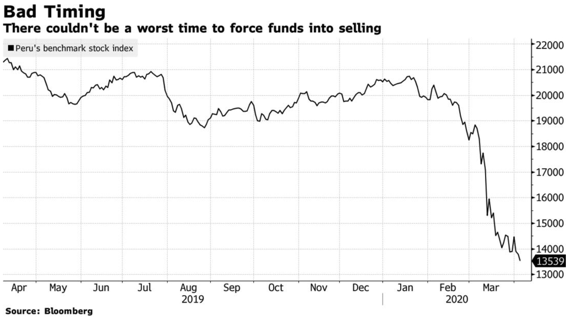Peru’s Congress Approves Bill for Pension Savings Withdrawals
April 4, 2020 - Original article: Bloomberg
By John Quigley
• Pension funds may have to sell $8.7 billion in assets
• Government opposes law, warns borrowing costs may rise
Peru’s Congress approved a bill to let workers withdraw as much as 25% of their pension savings to soften the blow of the coronavirus pandemic, casting aside warnings the measure will spook investors and push up borrowing costs.
Lawmakers voted 107-4 in favor of the bill late on Friday, according to a video broadcast on state television.
The pensions proposal from the newly-installed Congress has shaken the $44 billion private pension industry and dented investor confidence. It comes as the government is pushing a 90 billion-sol ($26 billion) stimulus package to deal with the economic impact from the coronavirus pandemic that’s prompted a nationwide quarantine, killed 61 Peruvians and infected almost 1,600.
Tracking COVID-1
79,795 -- New cases reported worldwide, April 11
110,056 -- Total deaths reported worldwide
29,861 in U.S. -- Most new cases today
-18% -- Change in MSCI World Index of global stocks since Wuhan lockdown, Jan. 23
-1.013 -- Change in U.S. treasury bond yield since Wuhan lockdown, Jan. 23
A potential fire sale of up to $8.7 billion in stocks and bonds by Peru’s four private pension funds has alarmed foreign investors, who own more than half the country’s local currency debt. The sol and local currency bonds declined this week and analysts are warning that the sell-off is only just beginning.

The legislation now will be sent to President Martin Vizcarra, who has 15 days to veto it, propose amendments or sign it into law. Congress can vote again for its promulgation.
Legislators said the 6 million Peruvians who have pensions should be entitled to tap their savings as quarantine measures paralyze the economy. The government says it is putting policies in place to help the poor and unemployed, including a more modest pension withdrawal for 3.7 million people.
The new law caps individual withdrawals at 12,900 soles and gives the fund managers, known as AFPs, just a few weeks to deposit the full amount in their customers’ bank accounts.
Friday’s vote went ahead despite the finance ministry, central bank, money managers and economists warning that a sudden asset sale by pension funds will cut demand for Peru’s debt at a time when the country is planning to tap global markets, and push up borrowing costs.
Similar proposals have been made in neighboring Chile, where pension fund manager AFP Uno proposed allowing Chileans to withdraw as much as 5% of their savings to help them weather the crisis. The Chilean government and other pension fund managers have criticized the proposal, saying that it goes against the idea of improving pensions in the future.
— With assistance by Eduardo Thomson